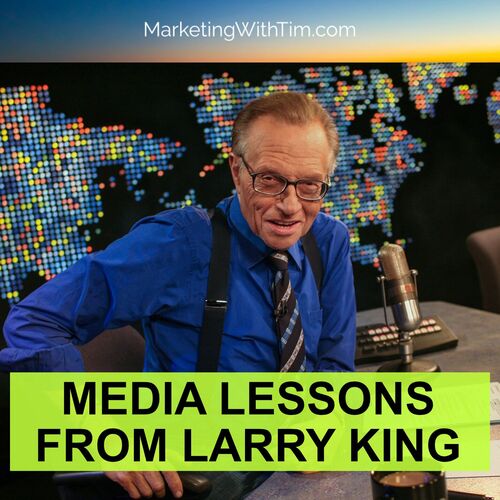
Ep. 34: Media Lessons From Larry King
Episode · 0 Play
Episode · 6:08 · Jan 24, 2021
About
Could you have appeared on The Larry King Show?As you may have heard media icon Larry King passed away this week at the age of 87. Over his 60 plus years in media, Larry spoke with thousands of guests on a wide range of topics, usually interviewing world leaders, and celebrities. And on occasion, the air quotes average Joe. Larry King was so impactful in the world of media, that during his 25-year run at CNN, if you told someone that you were appearing on Larry King, you didn't even have to mention the word show after his name. All you had to say was I'm going to be on Larry King and that gave you massive, instant credibility. But what was Larry King ultimately known for? Was he an expert in any one field? You could argue that his expertise was as simply as an interviewer. One of the criticisms of Larry King was that the questions he would pose to his guests would often-times come across as oversimplified. He wasn't really the “hard hitting journalist” like you would find on a program such as 60 minutes. But that’s not the focus here.Make no mistake: in a time I like to call “B. I.” (which stands for Before the Internet”) if you were able to get on Larry King's show, this gave you practically instant celebrity status.That’s because millions of eyeballs were almost certainly guaranteed to be on you. In the world of cable news ratings, Larry certainly was “King.”But the focus of Larry King’s show wasn't him, it was the guests he would have on. The audience tuned in to hear what the guests were going to say. And there were primarily three categories of guests that would ever appear on Larry King's show. These were 1: celebrities. In this case I'm using the term celebrities to encompass world leaders, government officials, and pop culture icons such as movie and tv stars, recording artists etc.The second category would be experts. When a breaking news story hit and Larry wanted to talk to somebody who knew vastly more about this subject than he did they would call in an expert in the field to explain it to the public in a way that everyone could understand. And the third category - this is where the “average joes” would gain their 15 minutes of notoriety - are eyewitnesses. The people whose lives are otherwise uneventful and rather ordinary, but just happened to be at the right place at the right time during a major world event.The format of the talk show has been around since the 1930s. Take Jack Benny for instance. His show was originally recorded in New York for a few years, but in 1936 he decided to move the show to Los Angeles so he could have celebrities on his show. Because at that time, that's where the celebrities were.Of course, this has changed over the years with most talk shows being recorded in New York or Los Angeles. Those shows are recorded where the celebrities are.For many decades ordinary people would not appear on such high profile shows unless there was reason. The prevailing thought was people don't tune into these shows to hear people like them. They tune into these shows to see people that they live through vicariously.Johnny Carson broke the mold somewhat by having normal people on his show. But David Letterman took it to a completely different level in the 1980s. I remember reading an interview with David Letterman one time and he said (and I'm paraphrasing) there is inherent entertainment value in having normal people on a show. Why do you think David Letterman had a recurring skit on his show called stupid human tricks? Current day shows such as Ellen, or most of the late-night talk shows, for instance, will still feature “ordinary” people…but this is usually to mock them, or use them as a subject in some “wacky” stunt to win a prize.Make no mistake, serious chat shows are still around and they're still very prominent. Especially on cable news outlets. And you can thank Larry King for making this format known in practically every household.But for you to gain access to these shows, you must be an expert in your field. Remember that most “normal” people that appear on these talk shows are usually the subjects of ridicule. Odds are, you won’t ever happen to be at the right place, at the right time, with the right vantage point to give a first-hand eyewitness account of some major breaking story. You’re probably not a world leader or high-ranking government official. Therefore, if you want to appear talk shows and as a guest on cable news outlets, you must increase your visibility as the expert in your field. And it doesn't matter what field you're in. Television and radio stations magazines print outlets high profile podcasts they all are looking for experts. Remember: 99% of Larry King's guests were either celebrities or experts. For the most part that still holds true today on these cable chat shows. The big question is, in its prime, could you have appeared on Larry King? Are you enough of an expert that show producers would have called you first? If you are at “expert-level” expert , your focus should be getting more people to recognize you as the go-to source on your topic. This is what can lead to those massive media appearances.---More marketing resources from Tim:Leave A Review & Subscribe On iTunes: https://podcasts.apple.com/us/podcast/marketing-with-tim/id1495561926Tim’s websites: https://www.MarketingWithTim.com https://www.SpeakerTim.comhttps://www.FreeGiftFromTim.com
6m 8s · Jan 24, 2021
© 2021 Spreaker (OG)